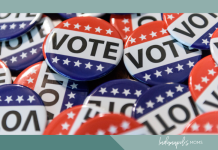 In many ways, I am an unlikely advocate for public schools. I, myself, never attended a public school until I attended Ball State University for my master’s degree. I am a teacher, though, and since I began my college career studying education, I have worked as a teacher in a public school and then become a parent of children in public schools. I have only grown in my conviction that America’s historic commitment to public education is what has set us apart from other countries and allowed for American exceptionalism for the last two centuries. I truly believe that our country’s future is dependent upon our support for public education.
In many ways, I am an unlikely advocate for public schools. I, myself, never attended a public school until I attended Ball State University for my master’s degree. I am a teacher, though, and since I began my college career studying education, I have worked as a teacher in a public school and then become a parent of children in public schools. I have only grown in my conviction that America’s historic commitment to public education is what has set us apart from other countries and allowed for American exceptionalism for the last two centuries. I truly believe that our country’s future is dependent upon our support for public education.
George Washington advocated for the importance of a system of public education in his Farewell Address when he said the creation of “institutions for the general diffusion of knowledge. In proportion as the structure of a government gives force to public opinion, it is essential that public opinion should be enlightened”. Our Founding Fathers understood that the success of this system of government depended on a citizenry that could read, write, evaluate, challenge, and value the policies being debated in the system that had been established. While the job of education has always largely rested with the states, the federal government has encouraged the creation and support of institutions for learning since the country’s founding. This is because the Founders understood that the country’s future rests upon our support for public education.
While the history towards universal schooling has been both uneven and gradual, by 1870, about 78% of children in the United States attended a public school. While the system was not (and still is not!) perfect or without criticism, the belief that children should have access to education and that the education they receive makes them better stewards of our country reflects that our country’s future is dependent upon our support for public education.
In our current climate, the promotion of school choice and parental rights appears to permeate all aspects of the education debate. Those who advocate for school choice argue that competition will benefit the education system. Respectfully, this argument is not only wrong but also harms our nation’s most valuable resource: its children. Supporters of school choice argue that competition forces schools to be more efficient and do more with less. While I am not an advocate for spending money unnecessarily, here’s the rub: public schools are not a business. As a society, we have historically invested in and supported public education because we understand that the investment reaps rewards beyond its price tag, as the country’s future is dependent on our support for public education.
Public schools are the only schools in our nation where you can not be turned away. This is something that often gets overlooked in the debate surrounding public schools and school choice. In practice, this means that when school choice is expanded, the most vulnerable students are left behind. I saw this firsthand when we lived in Arizona, where school choice and open enrollment are abundant. Those whose parents knew how to work the system and had the ability to provide transportation to the “better” schools did, while those who didn’t were left behind. A child’s educational opportunities should not be dependent upon the zip code in which they live. Unless we do more to ensure that all students have access to quality education, American exceptionalism will decline. We will miss out on scientific developments, amazing works of literature, and so much more if we do not do more to ensure ALL students have access to education. Our country’s advancements are directly tied to our support for public education.
Additionally, public schools continue to face increased demands. They are asked to be social workers, mediators, providers, and educators. Students cannot learn when they are hungry, tired, or worried about where they will sleep that night. Students cannot learn when they are in overcrowded classrooms where teachers cannot effectively apply best practices to teach them. As a society, it is time we stand up and recognize the vital role that public education plays in the success of our country. To ignore the crisis in our public schools is at our own peril because the destiny of our country is directly tied to our support for public education.








